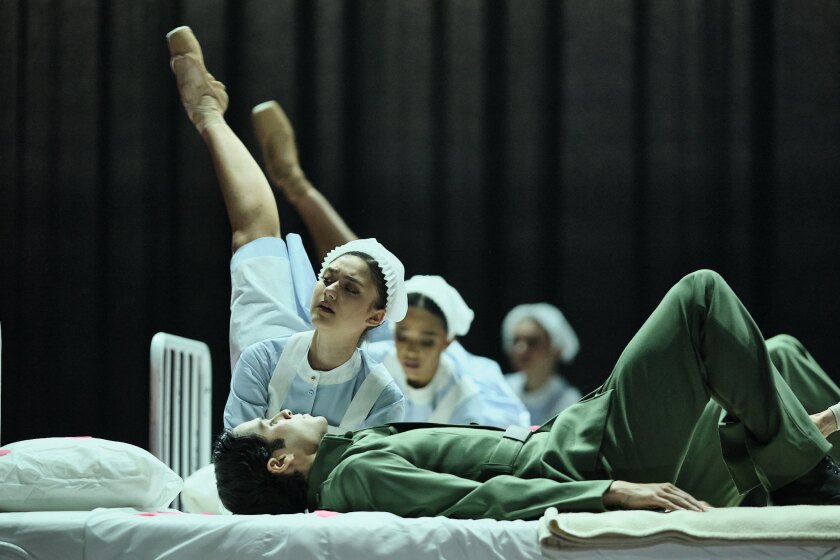New 'Atonement' ballet sets a teen's moral missteps into graceful motion

Catey Sullivan, Chicago Sun-Times
September 13, 2024
The road to hell, so the true cliche tells us, is paved with good intentions. But what happens on this earthly plane when a misguided attempt at righteousness irrevocably destroys the lives of those closest to you?
That’s the question facing Briony, the troubled anti-hero at the heart of Cathy Marston’s new ballet “Atonement.” Inspired by the beloved 2001 book by Ian McEwan, the ballet opens Oct. 17 in a U.S. premiere from the Joffrey Ballet.
“It’s a complicated narrative with a dense web of relationships,” said Marston, who first dreamt of turning McEwan’s novel (adapted into a 2007 movie starring Kiera Knightley and Saoirse Ronan) in the early aughts after she read it in graduate school. The ballet had its world premiere in 2023 at Ballet Zurich, where Marston is ballet director and chief choreographer.
The story begins among the landed gentry of England in 1935. Briony, a 13-year-old budding choreographer (she’s a writer in the novel) with a flair for the dramatic, believes she sees Robbie, the son of a family servant, sexually assaulting her older sister Cecilia in the family library and then her 15-year-old cousin Lola on the estate grounds.
Robbie’s innocent, but Briony’s testimony against him — abetted by the crushing lethality of classism — sends him to prison. Five years later as World War II ravages Europe, Briony realizes her accusations had no basis in reality, and becomes determined to atone and set things right.
Morally thorny and sweepingly ambitious, Marston’s ballet is an intense act of collaboration between the choreographer, composer Laura Rossi and dramaturg Edward Kemp.
“One of the first tasks Edward and I did was to take the story and sort of strip everything down and look at what storytelling is possible through dance and what could be too challenging. Then we developed scenarios, and a brief description of each scene and how many minutes it is — which form a sort of script that I then take to Laura,” Marston said.

Cathy Marston’s “Atonement” in its world premiere by Ballett Zürich | Admill Kuyler
“Often, when you try to reduce a complicated story to a few hours, the scenes become very short. A typical pas de deux is only about three minutes, so we have to get quite quickly to the point.
“In this story, we start out in an orderly, garden estate in the first scenes, and then open up to far more sweeping scenes, including the beach at Dunkirk where so many men were trapped (in 1940). The musical themes differ from character to character, scene to scene,” Marston said.
Rossi often sketches before she composes. “We first came up with a lot of words and emotions and feelings about what kind of people these characters are,” said Rossi. “I’ll draw pictures to get those feelings really clear, and then it’s a matter of translating those feelings into a piece of music.”
“One thing we came up with that’s repeated throughout is the idea of having a chord just for Briony. It’s this questioning music; we hear it when she sees her sister and Robbie making these weird shapes in the library,” she said.

Cathy Marston’s “Atonement” in its world premiere by Ballett Zürich | Admill Kuyler
In scoring the battlefield scenes, Rossi used artillery shells as percussion. When the nurses’ corps takes the stage, the music is “a little like Mendelssohn,” Marston said, “plucking strings that have this quiet, calm Englishness.”
Joffrey ensemble member Lucia Connolly is one of three dancers who will play Briony during the Joffrey’s run. She mentions class as a fundamental element of “Atonement.”
“In Cecilia and Robbie, you see two people trying to break free of this class system that says they’re not suited to each other; she’s wealthy and relatively high-born, he’s the son of a servant. This is partially a story of what can happen when you don’t assume the role society asks of you,” Connolly said.
“I know some people don’t like Briony,” Connolly added, echoing a sentiment both Marston and Rossi expressed. “But I have a lot of compassion for the mistakes of children. Hers is pretty catastrophic, but it comes from a place of wanting to do right. And she does have contrition,” Donnelly said.
Added Marston, “‘Atonement’ is a tragedy, but it’s also a deeply psychological drama. I don’t know that Briony ever really accepts responsibility for the consequences of her actions. But one of the things I’ve always loved about ‘Atonement’ is that McEwan gives us so much space to discuss it.”
'Atonement' runs October 17-27 at the Lyric Opera House. Purchase tickets here.